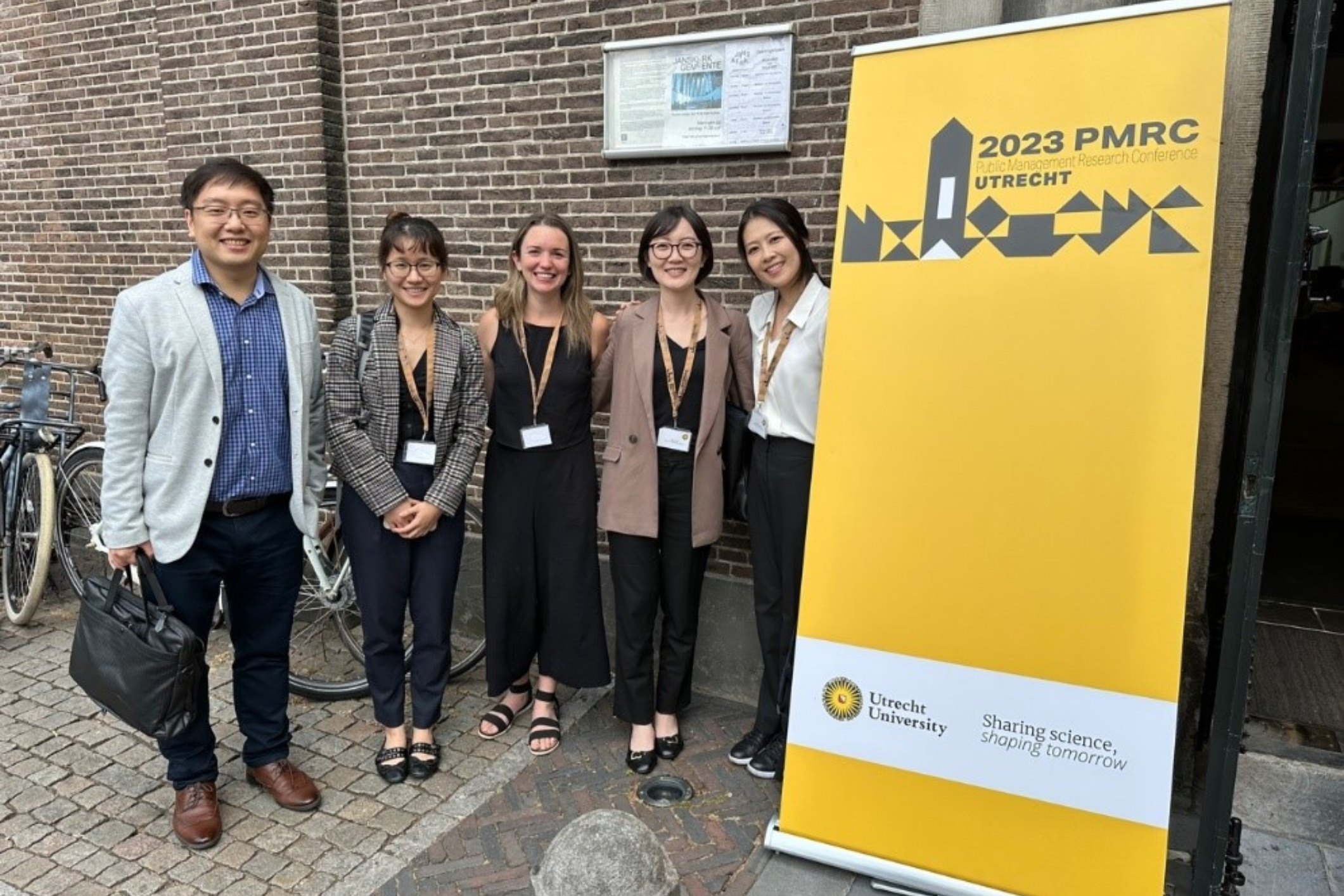From left to right: Dr. Ivan Lee, Ying Liu, Dr. Stephanie Walsh, Jinah Yoo, Dr. Miyeon Song
By Stephanie Walsh and Jinah Yoo
Two researchers affiliated with the New Jersey State Policy Lab, Dr. Stephanie Walsh and doctoral student Jinah Yoo, attended the Public Management Research Association’s Public Management Research Conference (PMRC) in Utrecht, the Netherlands from June 27-30, 2023. PMRC gathers international scholars to share and advance research on public management.
Stephanie presented work she co-authored with Dr. Gregory Porumbescu of the School of Public Affairs and Administration and Dr. Andrea Hetling of the Edward J. Bloustein School of Planning and Public Policy on the impact of information on program support. Their study investigated how efforts to enhance understanding of public assistance programs, particularly the Supplemental Nutrition Assistance Program (SNAP), by reducing learning costs affect public support for them. Bridging research from educational psychology with policy feedback theory, this study was preregistered with the expectations that improving communication of the SNAP application process and eligibility requirements would reduce learning costs and increase program support. Their survey experiment randomly assigned participants into a control group, or one of three treatment groups, including those viewing a one-page flyer, a screening tool, or a video. Broadly, their findings suggest that more effective communication tools – those which reduce learning costs – increase support for SNAP. Further research on this topic will explore the extent of this effect for different groups, particularly across political parties.
This paper was presented on a panel titled ‘Managing and Organizing for Enhancing and Rebuilding Trust in Government Agencies,’ chaired by Dr. Heidi Houlberg Salomonsen of Aarhus University and Dr. Marija Aleksovska of Utrecht University. In this panel, Dr. Tobias Bach of the University of Oslo and Dr. Koen Verhoest of the University of Antwerp presented their paper ‘Does Independence Increase Trust in Regulatory Agencies?’ which used a survey experiment to examine the relationship between the level of agency independence and perceived trust. Their initial results show that agency trustworthiness is not affected by political independence, but that more autonomy is associated with higher levels of trustworthiness. The third paper in this panel, titled ‘Silence Speaks Volumes: How Does Regulatory Communication Affect Citizens’ Trust?’ presented by Dr. Marija Aleksovska also used a survey experiment to test the public response to different agency communication methods following a crisis. They found that any response, whether it is defensive or proactive, is more effective in restoring citizen trust than silence.
Jinah presented her paper, “The Bankruptcy of Special Districts: What, When, and Why?’, co-authored with Dr. Pengju Zhang of the School of Public Affairs and Administration and Dr. Carolyn Abott of Baruch College – CUNY. This exploratory study analyzes bankruptcies among U.S. special districts[1] using a dataset spanning over 40 years from 1982 to 2021. As the first investigation into special district bankruptcy, this study provides an overview of the characteristics of special districts that have filed for bankruptcy and conducts an observational analysis on the drivers of bankruptcy filings. The findings revealed correlations between bankruptcy filings and county-level demographic and economic environments, such as the racial and age composition of the population and personal income per capita. Additionally, special districts’ internal financial management factors, including the tax share of total revenue and capital outlays, were also strongly associated with the likelihood of filing for bankruptcy. To further examine the factors influencing bankruptcy filings, the next steps of the study involve conducting in-depth comparisons between filing and non-filing special districts and interviewing local stakeholders and officials. The findings of this study will contribute to a better understanding of municipal bankruptcy and the financial sustainability of local governments.
This paper was presented on a panel titled ‘New Perspectives on Budgeting,’ chaired by Dr. Nathan Favero of American University. In this panel, Dr. Favero and Ms. Tingli Qu from American University presented their paper titled ‘US Federal Budgets and Federal Employee Satisfaction,’ which is an observational study that examines how volatile budgets caused by the US congressional gridlock and dysfunction relate to bureaucratic employee satisfaction. Their preliminary results demonstrate a correlation between budgetary changes and employee satisfaction, suggesting that dysfunction within the legislative branch has a negative influence on the administrative branch. In addition, Dr. Lene Holm Pederson and Mr. Karl-Emil Bendtsen from the University of Copenhagen presented their paper ‘Female Policymakers – Evidence from a Nordic Welfare State,’ which investigates the causal relationship between women’s democratic representation in local governments and its impact on agenda-setting and budgeting. Their findings indicate that while there are gender-based differences in preferences, these preferences do not have a clear impact on agenda-setting and budgeting processes.
Together, this work explores foundations of public management and offers insights into accountable public service delivery and financial stability of federal and local governments. As a multidisciplinary and international conference focused on sharing insights and new perspectives to improve public service, the venue was well matched for substantive discussion on each paper. Stephanie and Jinah were joined by Rutgers doctoral student Ying Liu and several Rutgers alumni.

Dr. Stephanie Walsh presenting at the Public Management Research Association’s Public Management Research Conference (PMRC) in Utrecht, photo credit: Lucas van der Wee.

Public Management Research Association’s Public Management Research Conference (PMRC) in Utrecht, photo credit: Lucas van der Wee.
References:
[1] Special districts are a type of local government created for a specific purpose, such as fire protection, library, healthcare, sanitation, and various other essential local services. According to the Census of Government, there are 38,542 special districts in the US, accounting for approximately 43% of all local governments. In New Jersey, there are 233 special districts as of 2017. Over the past four decades, a total of 217 bankruptcy cases have been filed by special districts.

